Itinerary
The main island of Singapore is shaped like a flattened diamond, 42 km (26 miles) east to west and 23 km (14 miles) north to south. Near the northern peak is the causeway leading to West Malaysia—Kuala Lumpur is less than four hours away by car. It is at the southern foot where you will find most of the city-state’s action, with its gleaming office towers, working docks, and futuristic “supertrees,” which are solar-powered and serve as vertical gardens. Offshore are Sentosa and over 60 smaller islands, most uninhabited, that serve as bases for oil refining or as playgrounds and beach escapes from the city. To the east is Changi International Airport, connected to the city by metro, bus, and a tree-lined parkway. Of the island’s total land area, more than half is built up, with the balance made up of parkland, farmland, plantations, swamp areas, and rain forest. Well-paved roads connect all parts of the island, and Singapore city has an excellent, and constantly expanding, public transportation system. The heart of Singapore’s history and its modern wealth are in and around the Central Business District. The area includes the skyscrapers in the Central Business District, the 19th-century Raffles Hotel, the convention centers of Marina Square, on up to the top of Ft. Canning. Although most of old Singapore has been knocked down to make way for the modern city, most colonial landmarks have been preserved in the CBD, including early-19th-century buildings designed by the Irish architect George Coleman.
Romantically referred to by the French as the Pearl of the Orient, Ho Chi Minh City today is a super-charged city of sensory overload. Motorbikes zoom day and night along the wide boulevards, through the narrow back alleys and past vendors pushing handcarts hawking goods of all descriptions. Still called Saigon by most residents, this is Vietnam’s largest city and the engine driving the country’s current economic resurgence, but despite its frenetic pace, it’s a friendlier place than Hanoi and locals will tell you the food—simple, tasty, and incorporating many fresh herbs—is infinitely better than in the capital.This is a city full of surprises. The madness of the city’s traffic—witness the oddball things that are transported on the back of motorcycles—is countered by tranquil pagodas, peaceful parks, quirky coffee shops, and whole neighborhoods hidden down tiny alleyways, although some of these quiet spots can be difficult to track down. Life in Ho Chi Minh City is lived in public: on the back of motorcycles, on the sidewalks, and in the parks. Even when its residents are at home, they’re still on display. With many living rooms opening onto the street, grandmothers napping, babies being rocked, and food being prepared, are all in full view of passersby.Icons of the past endure in the midst of the city’s headlong rush into capitalism. The Hotel Continental, immortalized in Graham Greene’s The Quiet American, continues to stand on the corner of old Indochina’s most famous thoroughfare, the rue Catinat, known to American G.I.s during the Vietnam War as Tu Do (Freedom) Street and renamed Dong Khoi (Uprising) Street by the Communists. The city still has its ornate opera house and its old French city hall, the Hôtel de Ville. The broad colonial boulevards leading to the Saigon River and the gracious stucco villas are other remnants of the French colonial presence. Grisly reminders of the more recent past can be seen at the city’s war-related museums. Residents, however, prefer to look forward rather than back and are often perplexed by tourists’ fascination with a war that ended 40 years ago.The Chinese influence on the country is still very much in evidence in the Cholon district, the city’s Chinatown, but the modern office towers and international hotels that mark the skyline symbolize Vietnam’s fixation on the future.
Romantically referred to by the French as the Pearl of the Orient, Ho Chi Minh City today is a super-charged city of sensory overload. Motorbikes zoom day and night along the wide boulevards, through the narrow back alleys and past vendors pushing handcarts hawking goods of all descriptions. Still called Saigon by most residents, this is Vietnam’s largest city and the engine driving the country’s current economic resurgence, but despite its frenetic pace, it’s a friendlier place than Hanoi and locals will tell you the food—simple, tasty, and incorporating many fresh herbs—is infinitely better than in the capital.This is a city full of surprises. The madness of the city’s traffic—witness the oddball things that are transported on the back of motorcycles—is countered by tranquil pagodas, peaceful parks, quirky coffee shops, and whole neighborhoods hidden down tiny alleyways, although some of these quiet spots can be difficult to track down. Life in Ho Chi Minh City is lived in public: on the back of motorcycles, on the sidewalks, and in the parks. Even when its residents are at home, they’re still on display. With many living rooms opening onto the street, grandmothers napping, babies being rocked, and food being prepared, are all in full view of passersby.Icons of the past endure in the midst of the city’s headlong rush into capitalism. The Hotel Continental, immortalized in Graham Greene’s The Quiet American, continues to stand on the corner of old Indochina’s most famous thoroughfare, the rue Catinat, known to American G.I.s during the Vietnam War as Tu Do (Freedom) Street and renamed Dong Khoi (Uprising) Street by the Communists. The city still has its ornate opera house and its old French city hall, the Hôtel de Ville. The broad colonial boulevards leading to the Saigon River and the gracious stucco villas are other remnants of the French colonial presence. Grisly reminders of the more recent past can be seen at the city’s war-related museums. Residents, however, prefer to look forward rather than back and are often perplexed by tourists’ fascination with a war that ended 40 years ago.The Chinese influence on the country is still very much in evidence in the Cholon district, the city’s Chinatown, but the modern office towers and international hotels that mark the skyline symbolize Vietnam’s fixation on the future.
Da Nang is the third largest city in Vietnam with the land area of 1283 square kilometre and the population of approximately 1million people. Da Nang is growing into one of the most organized urban area, with attractive beach front villas on the one side and Han River flowing on the other. Of the few attractions that belong to the city, Museum of Cham stands out with its rich collection of Cham artefacts. For those who crave for more outdoors activities, My Khe beach is a good place to spend time, either by yourself or with your loved ones. Da Nang is in close proximity to Hue- 3 hours North and Hoi An- 30 minutes south, which makes it a perfect stop point for those who need a break from touristy areas. Hue was once the Royal Capital of Viet Nam. The city represents the outstanding demonstration of the power of the vanished Vietnamese feudal empire, including a complex of monuments, tombs and pagodas that attract tourists coming from all over the world. Hoi An has to this days well preserved its most sacred treasure, the centuries-old architecture. The town used to harbour foreign traders back in the 17-18th, and once is an important heavily-frequented trading port in Southeast Asia.
Hue (pronounced hway), bisected by the Perfume River and 13 km (8 mi) inland from the South China Sea, in the foothills of the Annamite Mountains (Truong Son Mountains), stands as a reminder of Vietnam’s imperial past. The seat of 13 Nguyen-dynasty emperors between 1802 and 1945, Hue was once Vietnam’s splendid Imperial City. Although it was devastated by the French in the 19th century and again by fighting between the Vietnamese Communists and the Americans in the 20th, the monument-speckled former capital has a war-ravaged beauty. One can still imagine its former splendor, despite gaping holes in its silhouette. Hue is a UNESCO World Heritage Site, and the city’s gems are slowly being restored.
A visit to the north is not complete without a trip to Halong Bay, where placid waters give way to more than 3,000 limestone karsts and wind-sculpted limestone formations that jut from foggy lagoons. Dotting the bay are tiny islands bordered by white sandy coves and hidden caves, adding to the majestic landscape of this UNESCO World Heritage Site. Adding to this naturalist’s dream is the biodiversity of islets, grottos, and Cat Ba Island National Park. The bay, however, shows tourism’s impact: the clearing of mangrove forests to make way for jetties and piers, marine life threatened by game fishing, and garbage from passenger boats and fishing villages washed up on the shores.Beyond its geological uniqueness are activities like hiking, kayaking, rock climbing, or exploring one of the many floating villages where fishermen bring in their daily catch. The downside to all this allure is the large number of unlicensed boats it draws to the bay each day.Boat trips out onto the bay are the main tourism stock in trade farther north, but a more multifaceted side of the area can be experienced at Cat Ba Island. The largest island in Halong Bay, Cat Ba is very much its own entity. Its national park offers incredible biodiversity, with more than a thousand species of plants having been recorded here. Animal life is slightly thinner on the ground, but alert visitors may spy inhabitants such as the endangered golden-headed langur, wild boar, deer, civets, and several species of squirrel. Trekking through the wilderness is a highlight with a number of fascinating trails to follow.Cat Ba Island has also become a firm favorite with the adventure sports set. Indeed, along with Railay Beach in Thailand, it is recognized as one of the top spots in the region for rock climbing. Other outdoor pursuits include sailing and kayaking around the karsts. Although Halong Bay has arguably been tainted by over-exposure, Bai Tu Long Bay farther east toward China, retains all the majesty of Vietnam’s premier bucket-list natural attraction but sees a fraction of the traffic of its immediate neighbor to the west. Here, visitors will find islands of substantial size with deserted beaches and untamed jungle. Halong Bay’s 3,000 islands of dolomite and limestone cover a 1,500-square-km (580-square-mile) area, extending across the Gulf of Tonkin nearly to the Chinese border. According to legend, this breathtaking land- and seascape was formed by a giant dragon that came barreling out of the mountains toward the ocean—hence the name (Halong translates into “descent of the dragon”). Geologists are more likely to attribute the formations to sedimentary limestone that formed here between 300 and 500 million years ago, in the Paleozoic Era. Over millions of years water receded and exposed the limestone to wind, rain, and tidal erosion.Today the limestone formations are exposed to hordes of tourists—but don’t let that discourage you. Hundreds of fishing trawlers and tour boats share space on these crystal waters, yet there seems to be room for everyone. Most people use the main population center, Halong City, as a base from which to venture into the bay. Although it’s now officially one municipality, Halong City was, until 1996, two separate towns: Bai Chay is now Halong City West, where Halong Road winds its way around the coast and past the lifeless central beach; Hon Gai is the grimier Halong City East, where a coal transportation depot dominates the center of town and covers nearby roads and buildings with a sooty film. Locals still refer to the towns by their old names, but they are now inexorably lassoed together by a bridge. Boat trips through Halong Bay are the main attraction. Little of the majesty of this region can be found in the city, so head out onto the water and start exploring. Countless 10- and 30-foot fishing boats have been converted into Halong Bay’s formidable tourist-boat fleet. Hotels or travel agencies in Halong City or Hanoi can arrange boat trips for you (often they are part of organized tours from Hanoi). It is still possible to go down to the wharf and bargain yourself onto a boat for the day, but you are likely to be charged (sometimes significantly) more than you would pay for a prebooked tour, so this is not advised. Self-sufficient travelers have fallen victim to the old bait-and-switch: they’ve arranged a next-day boat tour with local fishermen, only to be told in no uncertain terms the following morning that they could not board their chosen boat, but they could take a different one for quite a bit more money. You may have no choice in the end. Usually travel agencies, however, have their tried-and-true favorites.
The Hong Kong Island skyline, with its ever-growing number of skyscrapers, speaks to ambition and money. Paris, London, even New York were centuries in the making, while Hong Kong’s towers, bright lights, and glitzy shopping emporia weren’t yet part of the urban scene when many of the young investment bankers who fuel one of the world’s leading financial centers were born. Commerce is concentrated in the glittering high-rises of Central, tucked between Victoria Harbor and forested peaks on Hong Kong Island’s north shore. While it’s easy to think all the bright lights are the sum of today’s Hong Kong, you need only walk or board a tram for the short jaunt west into Western to discover a side of Hong Kong that is more traditionally Chinese but no less high-energy. You’ll discover the real Hong Kong to the east of Central, too, in Wan Chai, Causeway Bay, and beyond. Amid the residential towers are restaurants, shopping malls, bars, convention centers, a nice smattering of museums, and—depending on fate and the horse you wager on—one of Hong Kong’s luckiest or unluckiest spots, the Happy Valley Racecourse. Kowloon sprawls across a generous swath of the Chinese mainland across Victoria Harbour from Central. Tsim Sha Tsui, at the tip of Kowloon peninsula, is packed with glitzy shops, first-rate museums, and eye-popping views of the skyline across the water. Just to the north are the teeming market streets of Mong Kok and in the dense residential neighborhoods beyond, two of Hong Kong’s most enchanting spiritual sights, Wong Tai Sin Temple and Chi Lin Nunnery. As you navigate this huge metropolis (easy to do on the excellent transportation network), keep in mind that streets are usually numbered odd on one side, even on the other. There’s no baseline for street numbers and no block-based numbering system, but street signs indicate building numbers for any given block.
The Hong Kong Island skyline, with its ever-growing number of skyscrapers, speaks to ambition and money. Paris, London, even New York were centuries in the making, while Hong Kong’s towers, bright lights, and glitzy shopping emporia weren’t yet part of the urban scene when many of the young investment bankers who fuel one of the world’s leading financial centers were born. Commerce is concentrated in the glittering high-rises of Central, tucked between Victoria Harbor and forested peaks on Hong Kong Island’s north shore. While it’s easy to think all the bright lights are the sum of today’s Hong Kong, you need only walk or board a tram for the short jaunt west into Western to discover a side of Hong Kong that is more traditionally Chinese but no less high-energy. You’ll discover the real Hong Kong to the east of Central, too, in Wan Chai, Causeway Bay, and beyond. Amid the residential towers are restaurants, shopping malls, bars, convention centers, a nice smattering of museums, and—depending on fate and the horse you wager on—one of Hong Kong’s luckiest or unluckiest spots, the Happy Valley Racecourse. Kowloon sprawls across a generous swath of the Chinese mainland across Victoria Harbour from Central. Tsim Sha Tsui, at the tip of Kowloon peninsula, is packed with glitzy shops, first-rate museums, and eye-popping views of the skyline across the water. Just to the north are the teeming market streets of Mong Kok and in the dense residential neighborhoods beyond, two of Hong Kong’s most enchanting spiritual sights, Wong Tai Sin Temple and Chi Lin Nunnery. As you navigate this huge metropolis (easy to do on the excellent transportation network), keep in mind that streets are usually numbered odd on one side, even on the other. There’s no baseline for street numbers and no block-based numbering system, but street signs indicate building numbers for any given block.
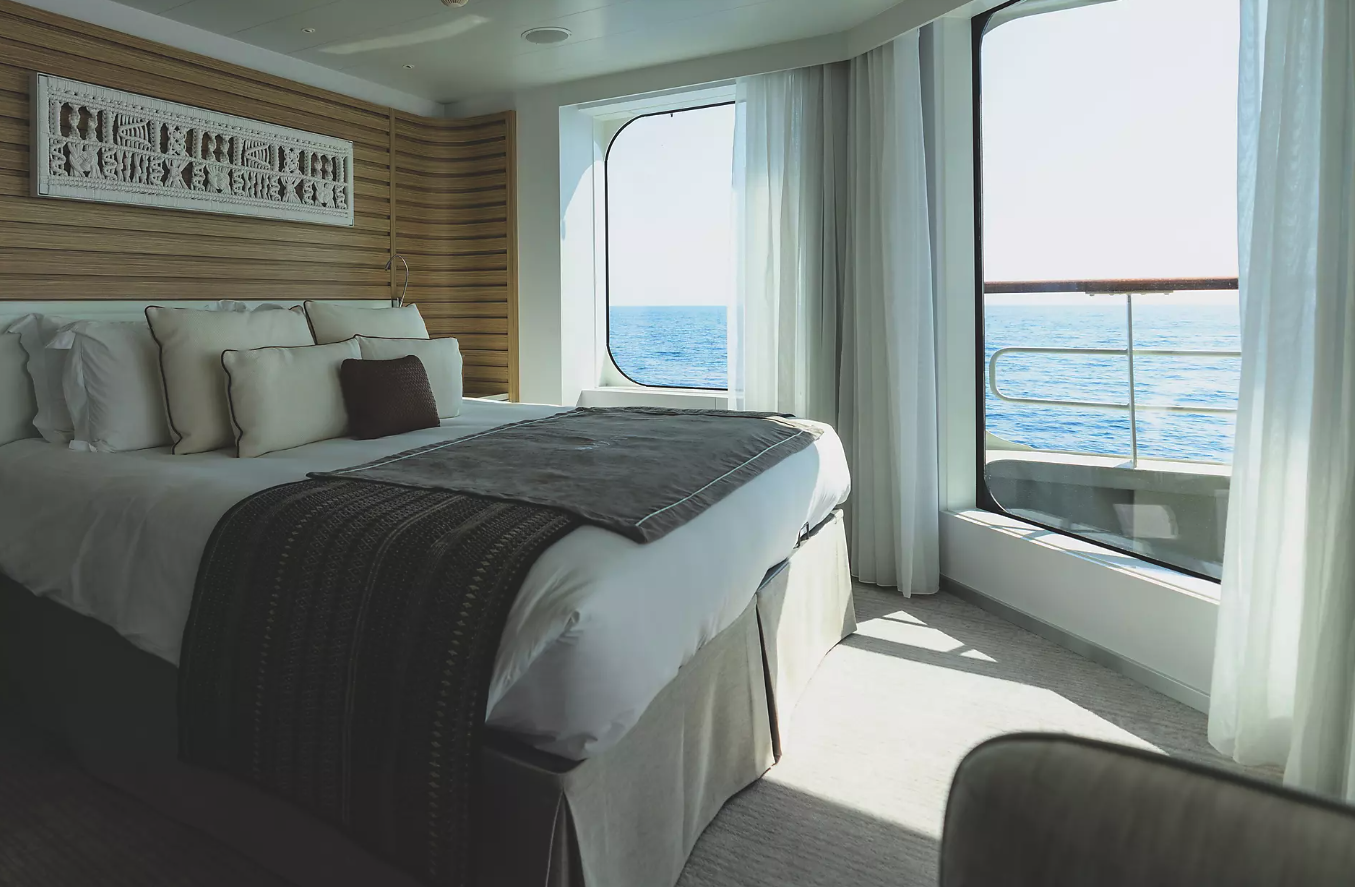
Services provided
- 24-hour room service
- Inclusive Wifi internet access (availability dependent on navigation and latitude)
- Individually-controlled air conditioning
- Dressing room with shelves and closet
- Dressing table and hairdryer
- Selection of Clarins top-of-the-line bath products
- Minibar
- Nespresso coffee maker and boiler
- Electronic safe
- Direct line telephone
- Bose Bluetooth speaker
- Flat screen TV, international channels (availability dependent on navigation) and videos on demand
- 110V American (two flat pins)/220V European (round sockets with two round pins)
- Two ADA staterooms
In addition to the common services provided to all our suites and staterooms:
- Private return transfer
- Priority boarding
- Champagne and fruit basket on arrival
- Butler service
- An assortment of sweet or savoury canapés and fruit basket every day
- A lounge with armchair, double sofa bed (160 x 190 cm), and second TV
- A bedroom with king-size bed (180 x 200 cm) or two single beds (90 x 200 cm)
- A bathroom with shower, Balneo bathtub and smart mirror
- A one-hour spa treatments per person (for 2 people) in the well-being space, chosen from the facial and body treatments on offer
- Included premium pass: access to a selection of premium spirits at the bar
- A private 40 m² terrace: 2 deckchairs, jacuzzi, and outdoor lounge area with sofa and armchair
- Two panoramic sliding bay windows
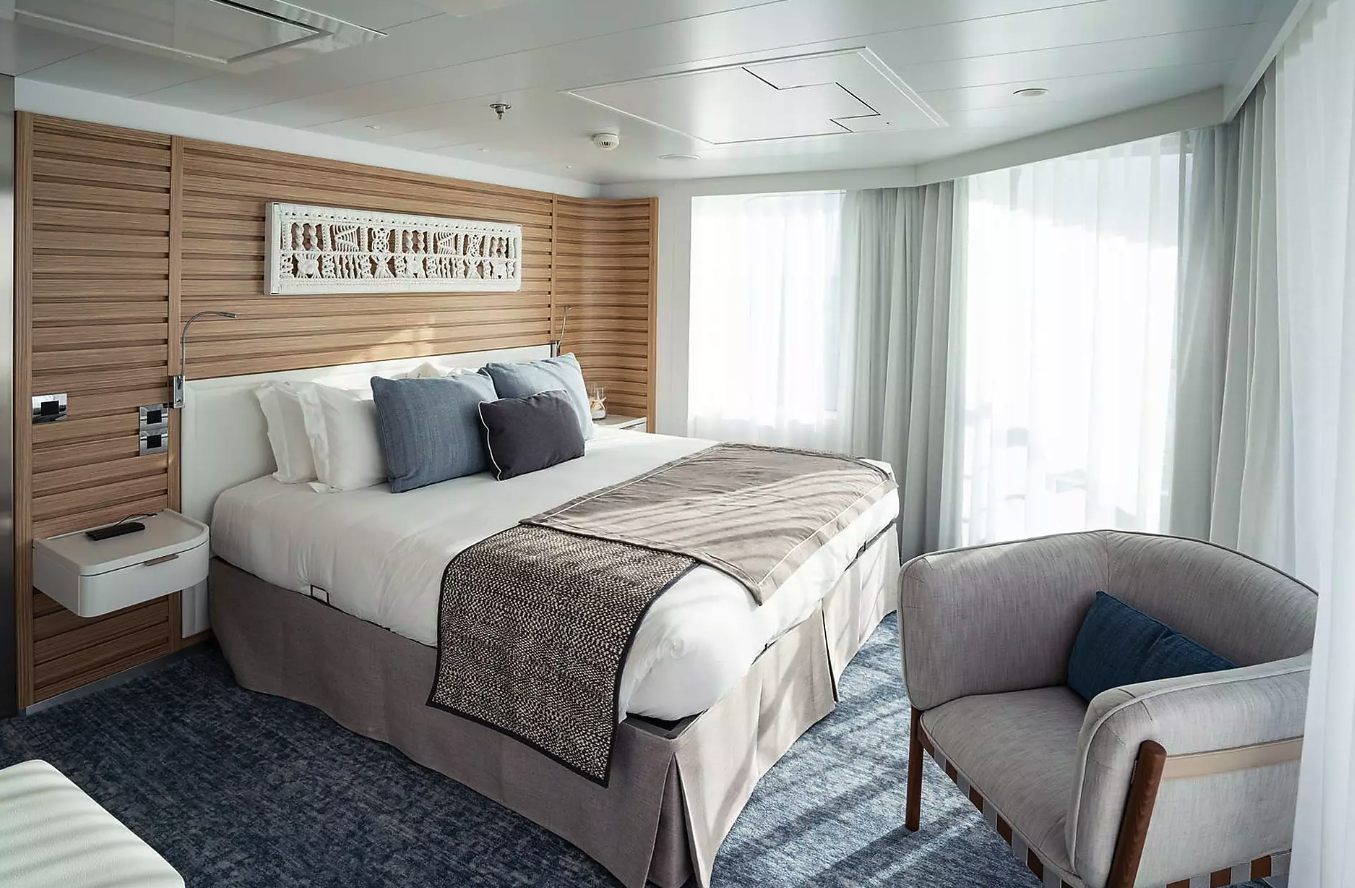
Services provided
- 24-hour room service
- Inclusive Wifi internet access (availability dependent on navigation and latitude)
- Individually-controlled air conditioning
- Dressing room with shelves and closet
- Dressing table and hairdryer
- Selection of Clarins top-of-the-line bath products
- Minibar
- Nespresso coffee maker and boiler
- Electronic safe
- Direct line telephone
- Bose Bluetooth speaker
- Flat screen TV, international channels (availability dependent on navigation) and videos on demand
- 110V American (two flat pins)/220V European (round sockets with two round pins)
- Two ADA staterooms
In addition to the common services provided to all our suites and staterooms:
- Priority boarding
- Champagne and fruit basket on arrival
- Butler service
- An assortment of sweet or savoury canapés and fruit basket every day
- A bedroom with one king-size bed (180 x 200 cm) or two single beds (90 x 200 cm)
- A lounge with sofa convetible to a double bed (160 x 190 cm), armchair, and second TV
- A bathroom with shower and Balneo bathtub
- A private 32 m² terrace with two deckchairs and four-seater dining table
- 2 panoramic sliding bay windows
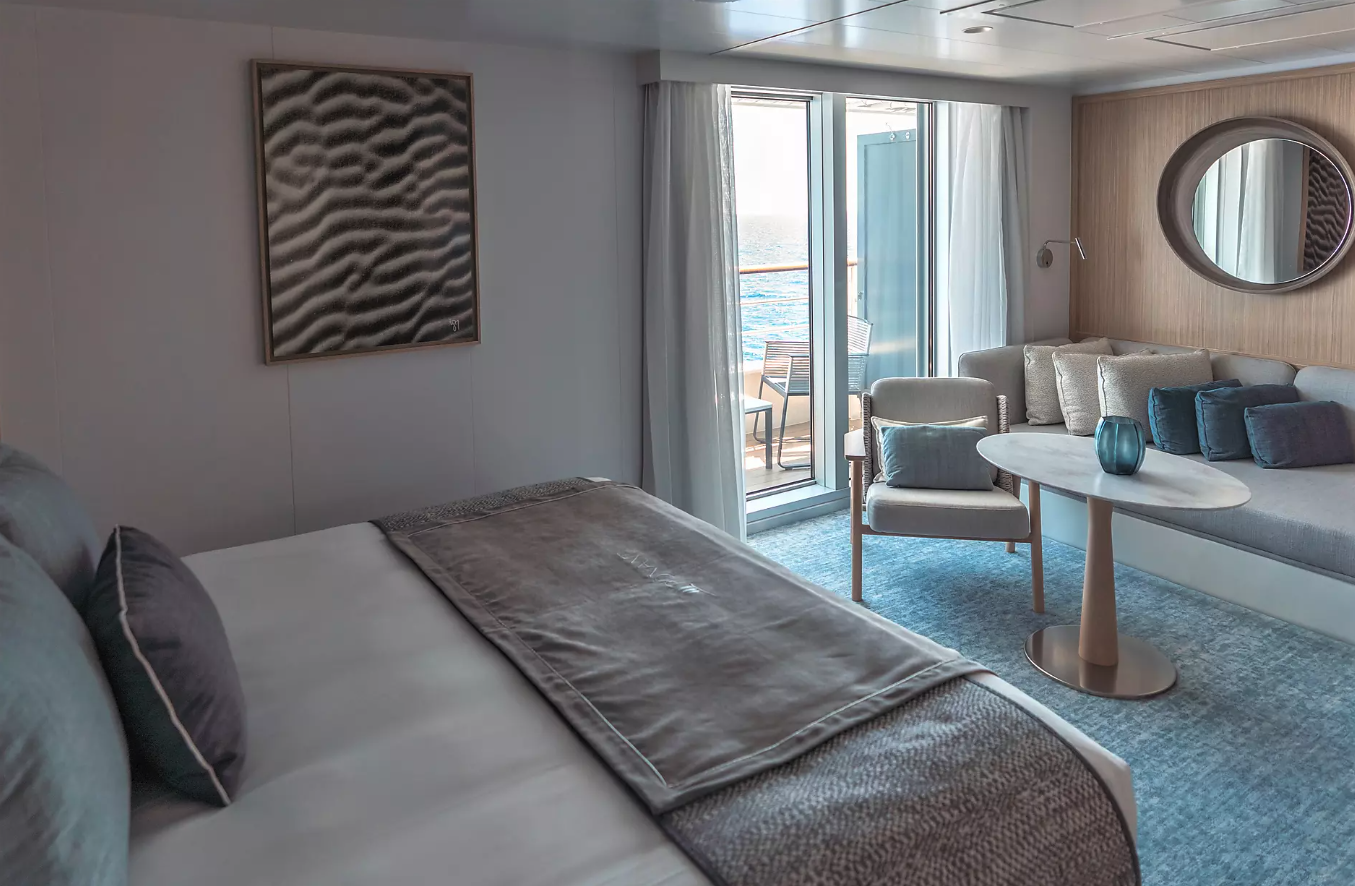
Services provided
- 24-hour room service
- Inclusive Wifi internet access (availability dependent on navigation and latitude)
- Individually-controlled air conditioning
- Dressing room with shelves and closet
- Dressing table and hairdryer
- Selection of Clarins top-of-the-line bath products
- Minibar
- Nespresso coffee maker and boiler
- Electronic safe
- Direct line telephone
- Bose Bluetooth speaker
- Flat screen TV, international channels (availability dependent on navigation) and videos on demand
- 110V American (two flat pins)/220V European (round sockets with two round pins)
- Two ADA staterooms
In addition to the common services provided to all our suites and staterooms:
- Priority boarding
- Champagne and fruit basket on arrival
- Butler service
- An assortment of sweet or savoury canapés and fruit basket every day
- One king-size bed (180 x 200 cm) or two single beds (90 x 200 cm)
- A lounge area with chaise longue and armchair
- A bathroom with shower
- A private 8 m² balcony with two armchairs
- A panoramic sliding bay window
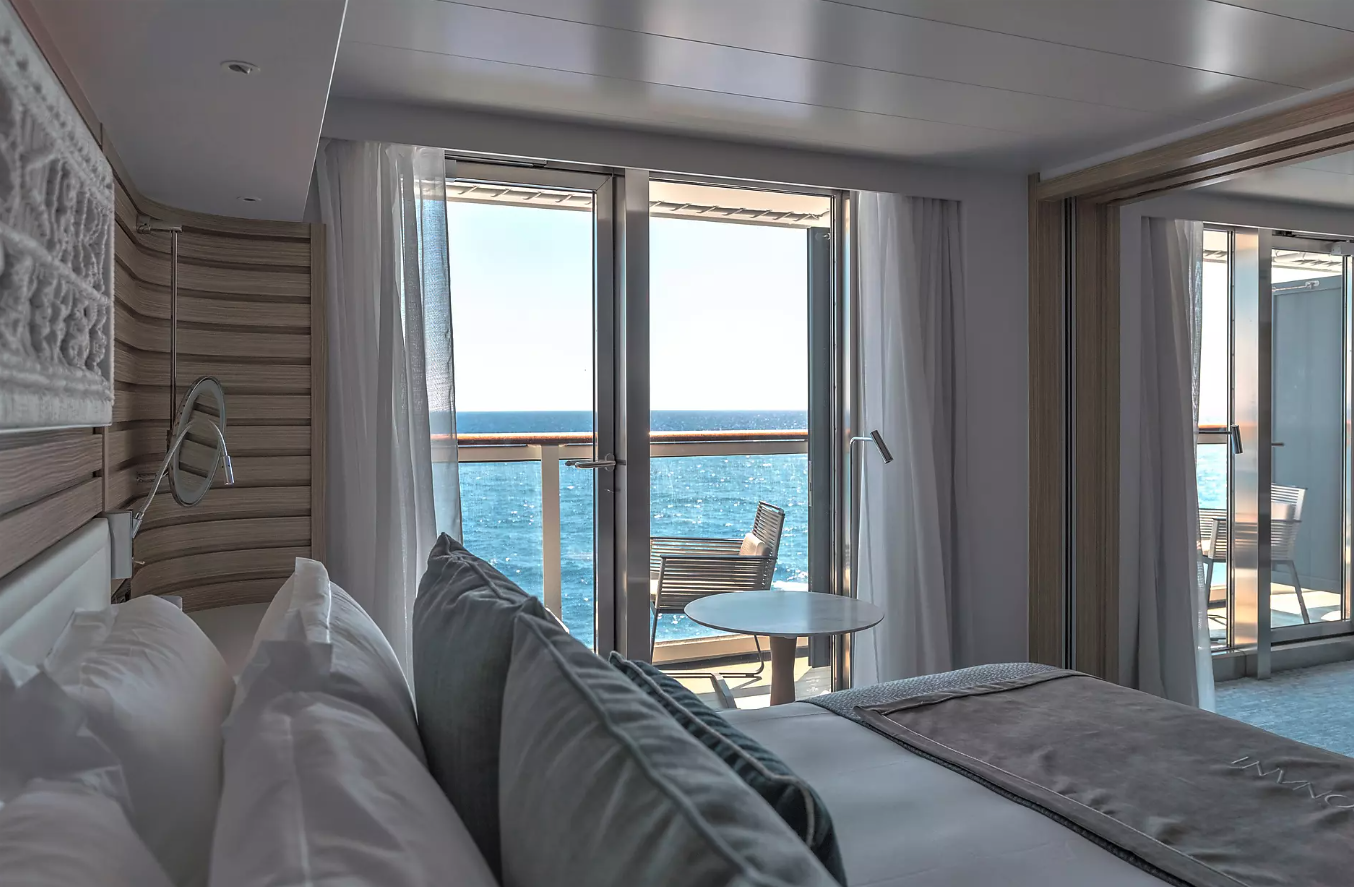
Services provided
- 24-hour room service
- Inclusive Wifi internet access (availability dependent on navigation and latitude)
- Individually-controlled air conditioning
- Dressing room with shelves and closet
- Dressing table and hairdryer
- Selection of Clarins top-of-the-line bath products
- Minibar
- Nespresso coffee maker and boiler
- Electronic safe
- Direct line telephone
- Bose Bluetooth speaker
- Flat screen TV, international channels (availability dependent on navigation) and videos on demand
- 110V American (two flat pins)/220V European (round sockets with two round pins)
- Two ADA staterooms
In addition to the common services provided to all our suites and staterooms:
- Priority boarding
- Champagne and fruit basket on arrival
- Butler service
- An assortment of sweet or savoury canapés and fruit basket every day
- A bedroom with king-size bed (180 x 200 cm) or two single beds (90 x 200 cm)
- A lounge with convertible sofa to a king-size bed (180 x 200 cm) or two single beds (90 x 200 cm), armchair, second TV, and sliding courtesy door
- Two bathrooms with shower
- A private 8 m² balcony with four armchairs
- Two panoramic sliding bay windows
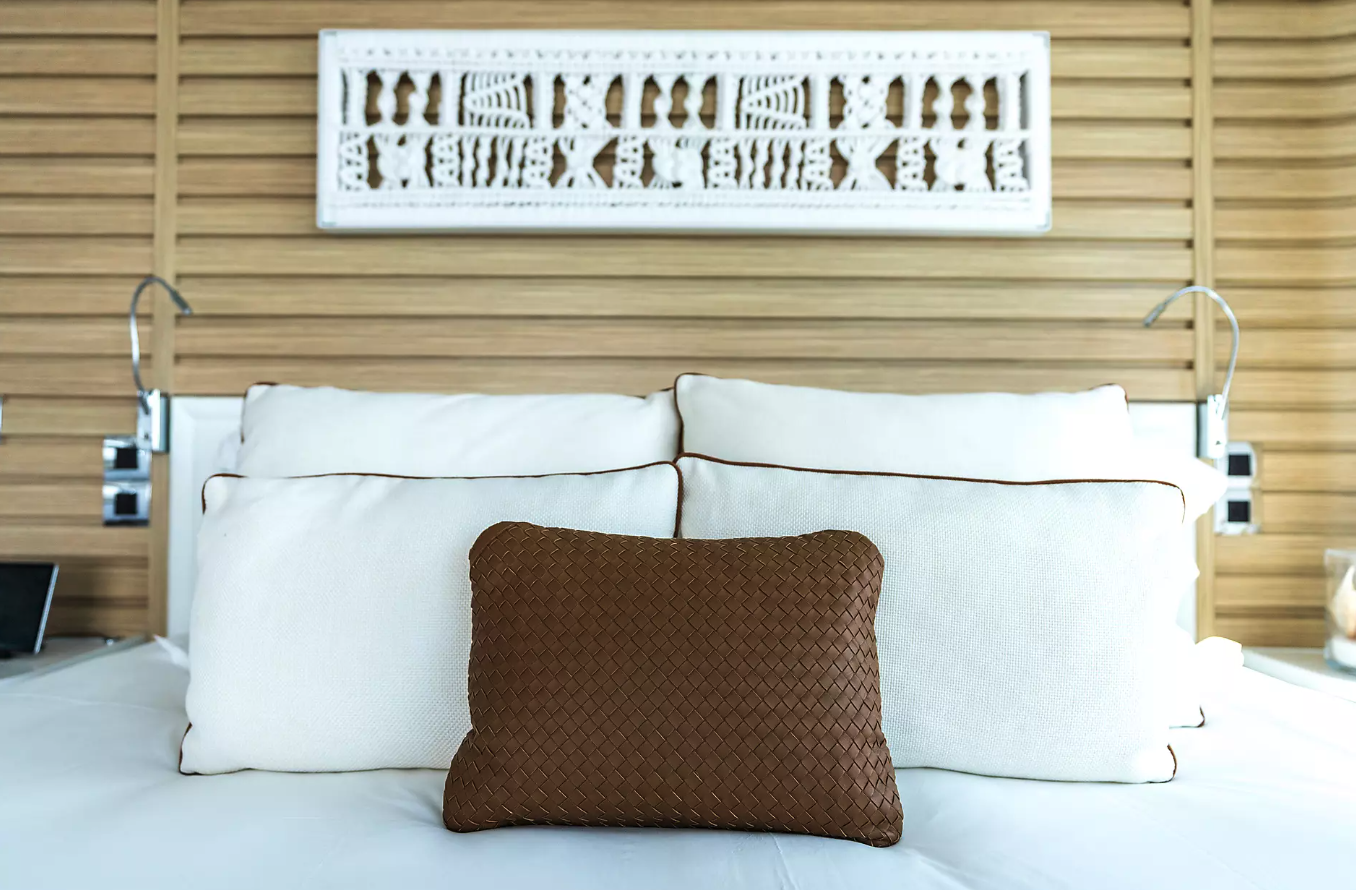
Services provided
- 24-hour room service
- Inclusive Wifi internet access (availability dependent on navigation and latitude)
- Individually-controlled air conditioning
- Dressing room with shelves and closet
- Dressing table and hairdryer
- Selection of Clarins top-of-the-line bath products
- Minibar
- Nespresso coffee maker and boiler
- Electronic safe
- Direct line telephone
- Bose Bluetooth speaker
- Flat screen TV, international channels (availability dependent on navigation) and videos on demand
- 110V American (two flat pins)/220V European (round sockets with two round pins)
- Two ADA staterooms
In addition to the common services provided to all our suites and staterooms:
- Champagne and fruit basket on arrival
- One king-size bed (180 x 200 cm) or two single beds (90 x 200 cm)
- An armchair and sofa (90 x 190 cm)
- A bathroom with shower
- A private 6 m² balcony with two armchairs
- A panoramic sliding bay window
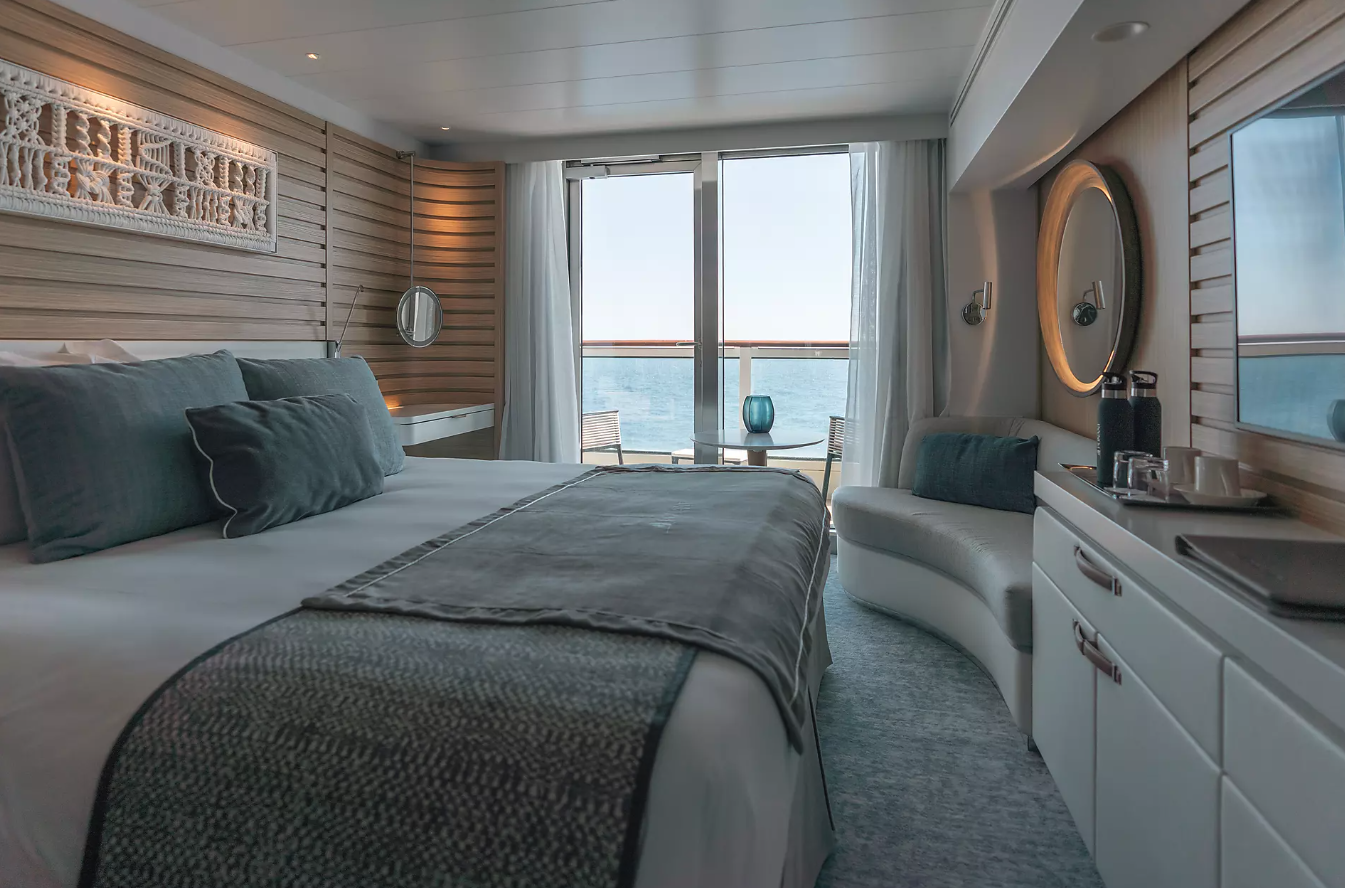
- Services provided
- 24-hour room service
- Inclusive Wifi internet access (availability dependent on navigation and latitude)
- Individually-controlled air conditioning
- Dressing room with shelves and closet
- Dressing table and hairdryer
- Selection of Clarins top-of-the-line bath products
- Minibar
- Nespresso coffee maker and boiler
- Electronic safe
- Direct line telephone
- Bose Bluetooth speaker
- Flat screen TV, international channels (availability dependent on navigation) and videos on demand
- 110V American (two flat pins)/220V European (round sockets with two round pins)
- Two ADA staterooms
In addition to the common services provided to all our suites and staterooms:
- One king-size bed (180 x 200 cm) or two single beds (90 x 200 cm)
- One chaise longue
- A bathroom with shower
- A private 4 m² balcony with two armchairs
- A panoramic sliding bay window or glazed panoramic swing door

Services provided
- 24-hour room service
- Inclusive Wifi internet access (availability dependent on navigation and latitude)
- Individually-controlled air conditioning
- Dressing room with shelves and closet
- Dressing table and hairdryer
- Selection of Clarins top-of-the-line bath products
- Minibar
- Nespresso coffee maker and boiler
- Electronic safe
- Direct line telephone
- Bose Bluetooth speaker
- Flat screen TV, international channels (availability dependent on navigation) and videos on demand
- 110V American (two flat pins)/220V European (round sockets with two round pins)
- Two ADA staterooms
In addition to the common services provided to all our suites and staterooms:
- One king-size bed (180 x 200 cm) or two single beds (90 x 200 cm) and TV
- A bathroom with shower
- A private 4 m² balcony with two armchairs
- A glazed panoramic swing door and rectangular window

Towards the rear of deck 4 you’ll find a panoramic restaurant large enough to accommodate all our passengers at one sitting. Offering a different concept than on our other ships, this space is open to the exterior and serves buffets of salads, desserts and cheeses. Our discreet and attentive staff provide a table service for hot meals.
- 260 m2 (2,800 ft²)
- Wine cellar

An exterior grill restaurant on deck 3 offering a relaxed ambiance and atmosphere:
- Capacity: 70
- Views out over the pool deck
- Grilled meats and a variety of salads and desserts
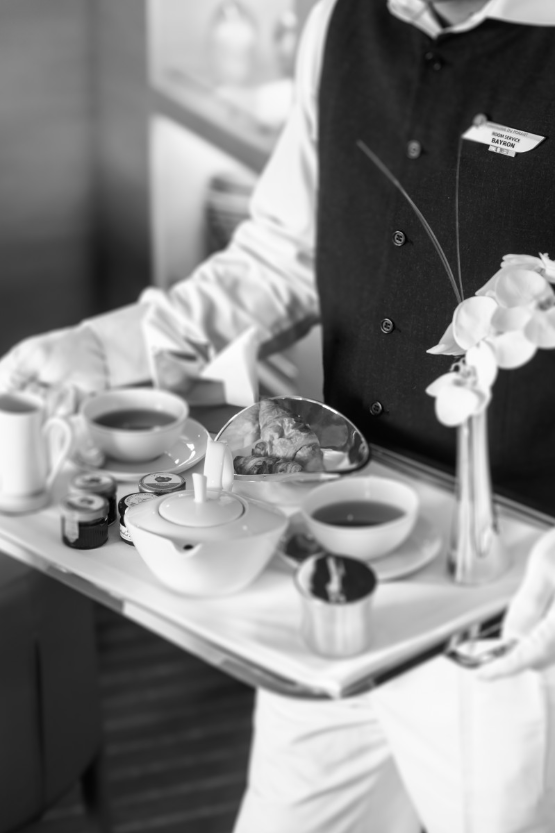
Whether you wish to have breakfast in the privacy of your stateroom, savour a snack in the middle of the day or enjoy your dinner in an intimate setting, our Room Service is available for you. Have a gourmet interlude and treat yourself from a varied menu at any time of day or night.
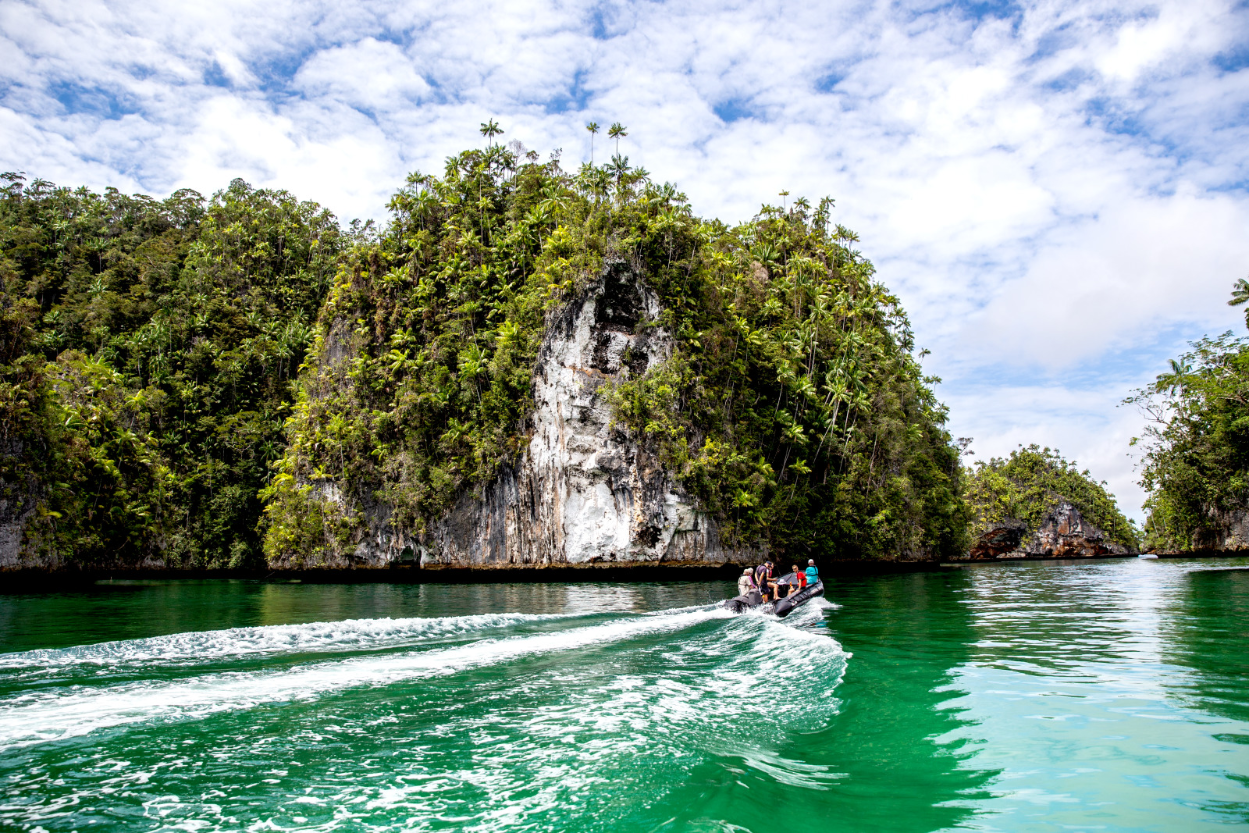
Excursions & land itineraries
Each itinerary has been thoughtfully created by our teams to offer you a complete excursion experience. You can discover the hidden gems of the regions you visit in line with your interests.
Hidden creeks, ancient cities, UNESCO world heritage sites… the world reveals its hidden gems as you journey along the routes taken by travellers. In keeping with our ethos “Accessing the worlds treasures by sea”, we offer a wide choice of land excursions during all our cruises (except for expeditions). Chosen by our PONANT experts for their cultural value and historic interest, these excursions can last a few hours or a few days. If you need to stay on land overnight, we take care of your stay from start to finish, until you rejoin your ship. These longer excursions mean you can discover the unmissable sites of the region you are visiting, like Cuzco in Peru for example or the Mekong Delta in Vietnam.
You can access these trips by pre-booking two months before your departure date.
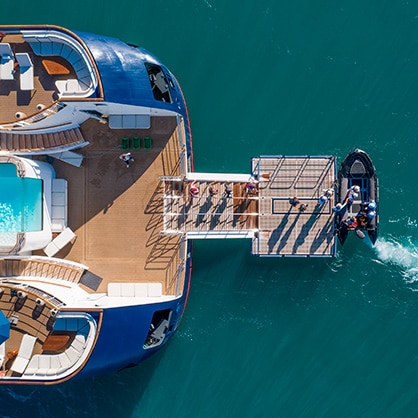
- Deck 2
- Much easier onboard access than on any other cruise ship
- Easier disembarking and embarking by Zodiac when participating in expeditions
- Swimming and bathing in the sea and various nautical sports, such as kayaking and paddle-boarding
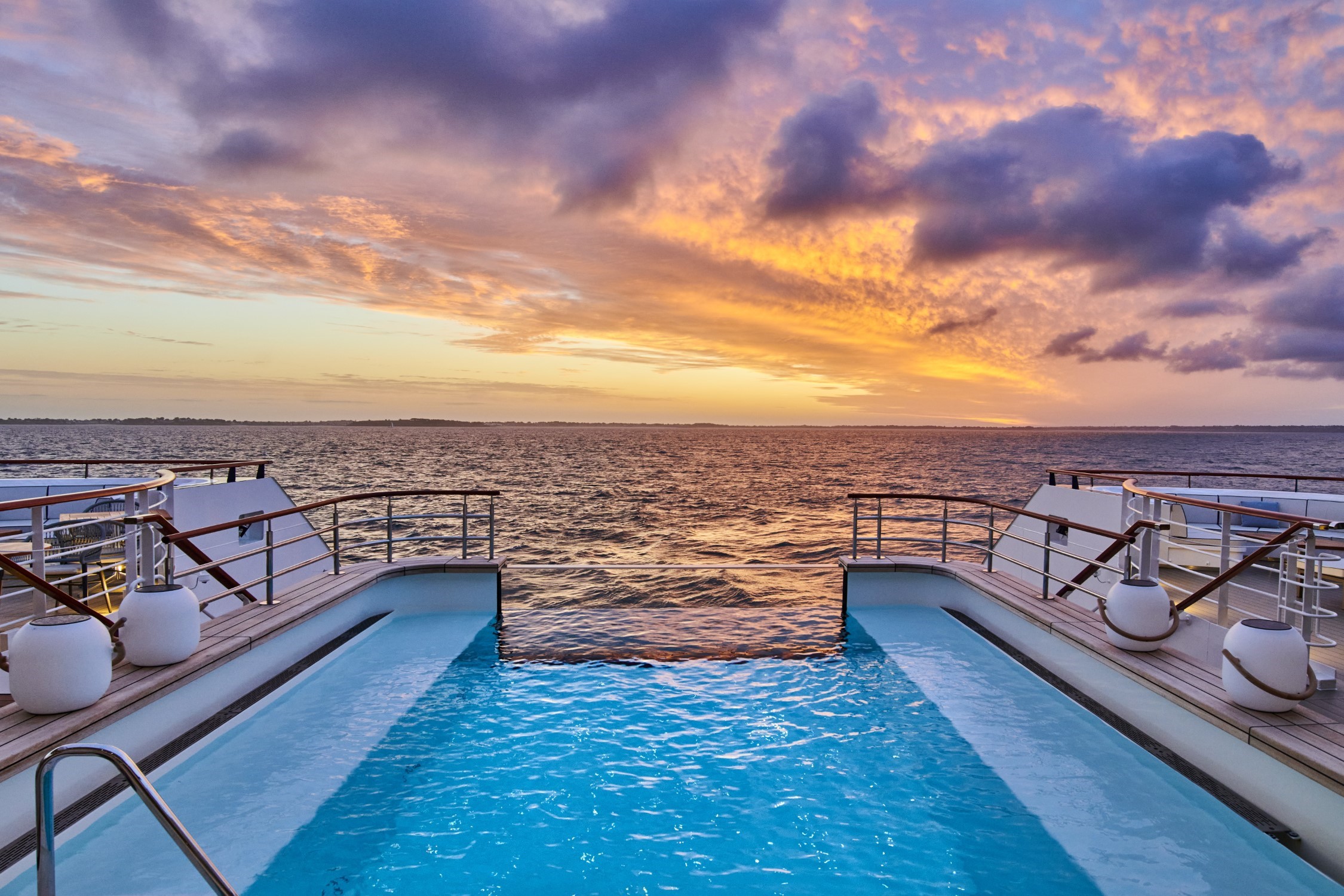
- A swimming pool offering panoramic views and equipped with a counter-current system
- A pleasant, attractive sun deck
- An exterior bar and lounge equipped with armchairs and sofas
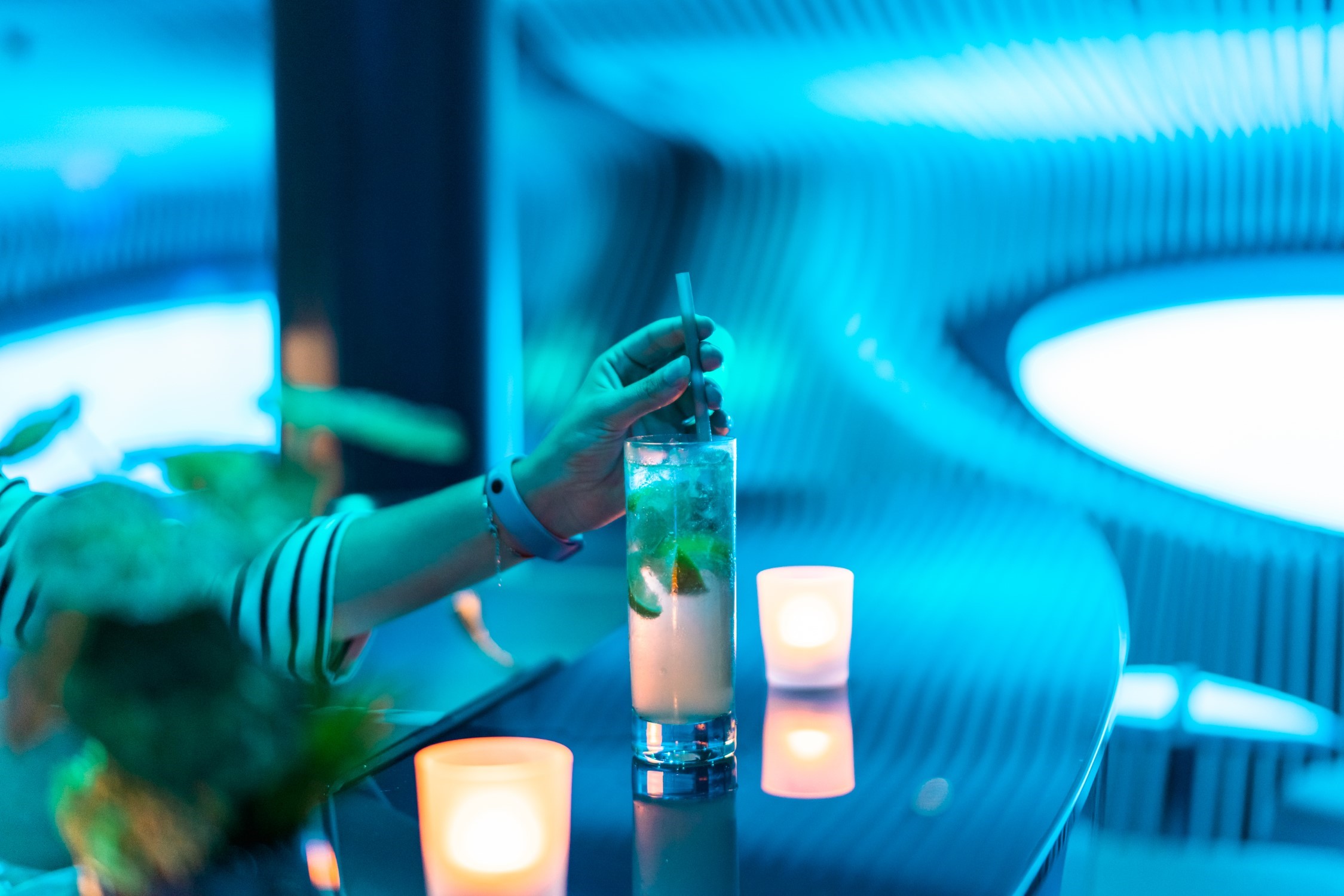
- A multi sensorial underwater lounge
- Enough room for 40 passengers
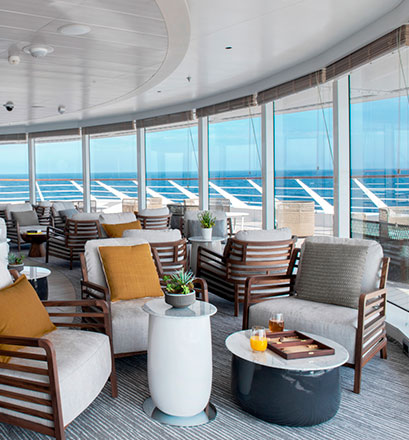
-
Library, internet space, bar, and live entertainment on certain evenings
- Direct access to the panoramic terrace
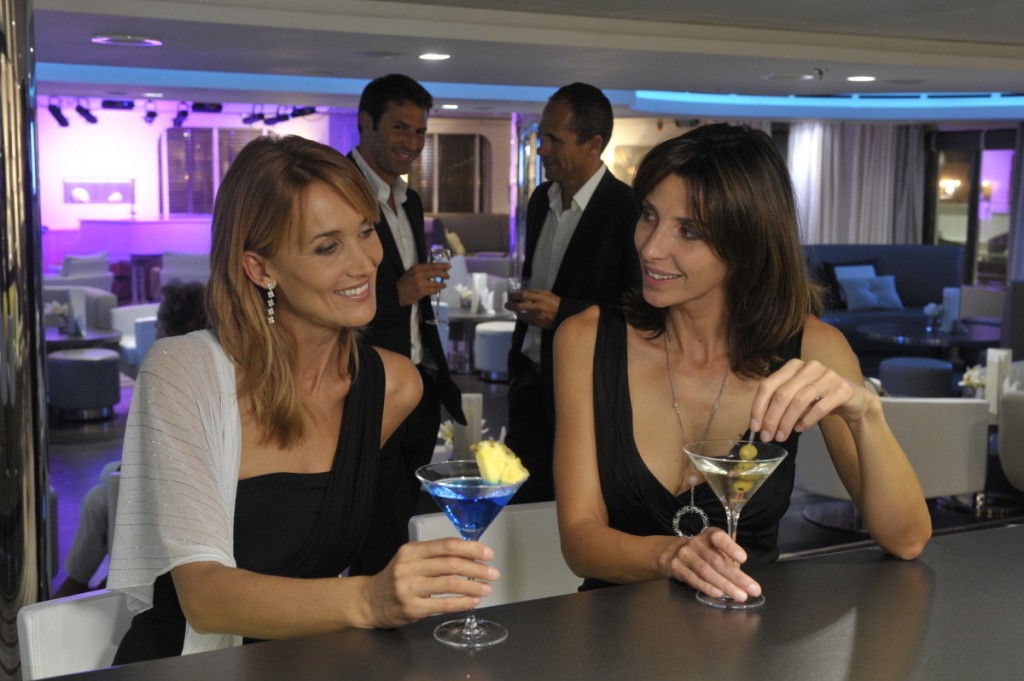
The various different lounges allow passengers to meet up and share quality time together.
The main lounge is the ideal place to relax with a drink and enjoy the various activities that have been organised such as dancing classes or theme evenings.
The cosy piano bar is a panorama lounge with breathtaking views of the horizon.
The outside bar is a great space for relaxing and is handy for accessing the swimming pool* and its solarium.
The Main Lounge – Deck 3
- A 200 m² (2,150 ft²) main lounge
- Able to accommodate all our passengers at once for moments of shared conviviality, and as a venue for both daytime and evening shows and entertainment
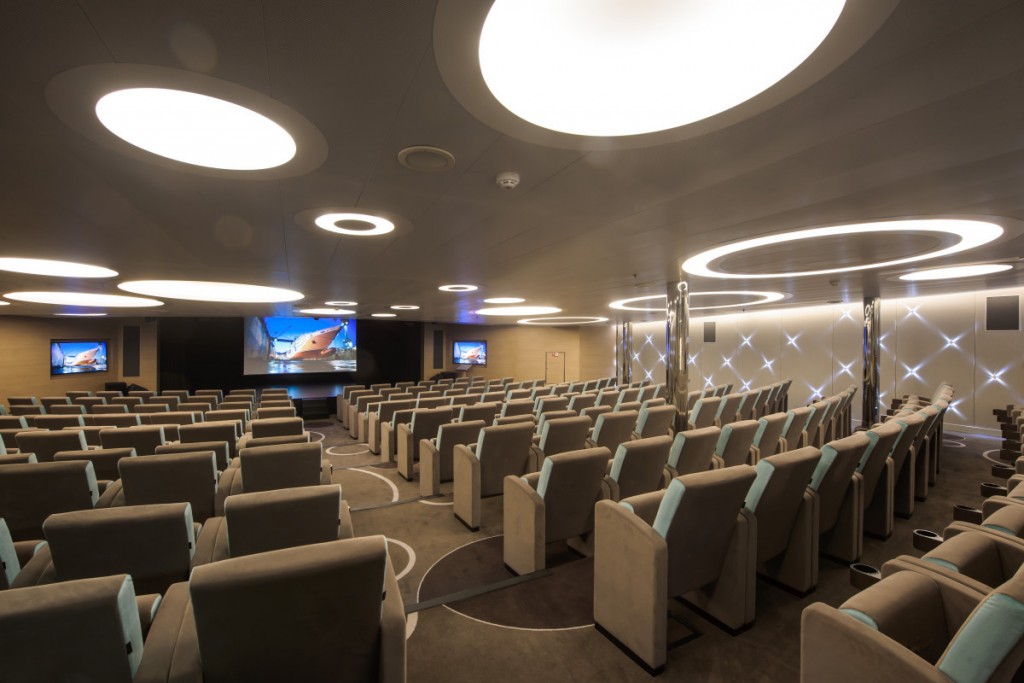
- 188-seat capacity
- Cutting edge audio and lighting technology
- LED stage background wall enabling the projection of ultra-high resolution media
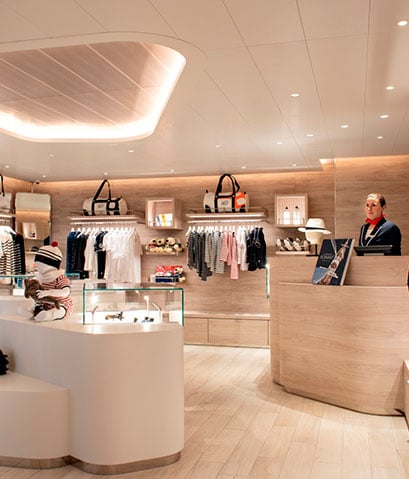
On board all our ships, a shop is open during sailing. It offers a selection of presents and souvenirs: clothing, jewellery, beauty products, postcards and accessories.
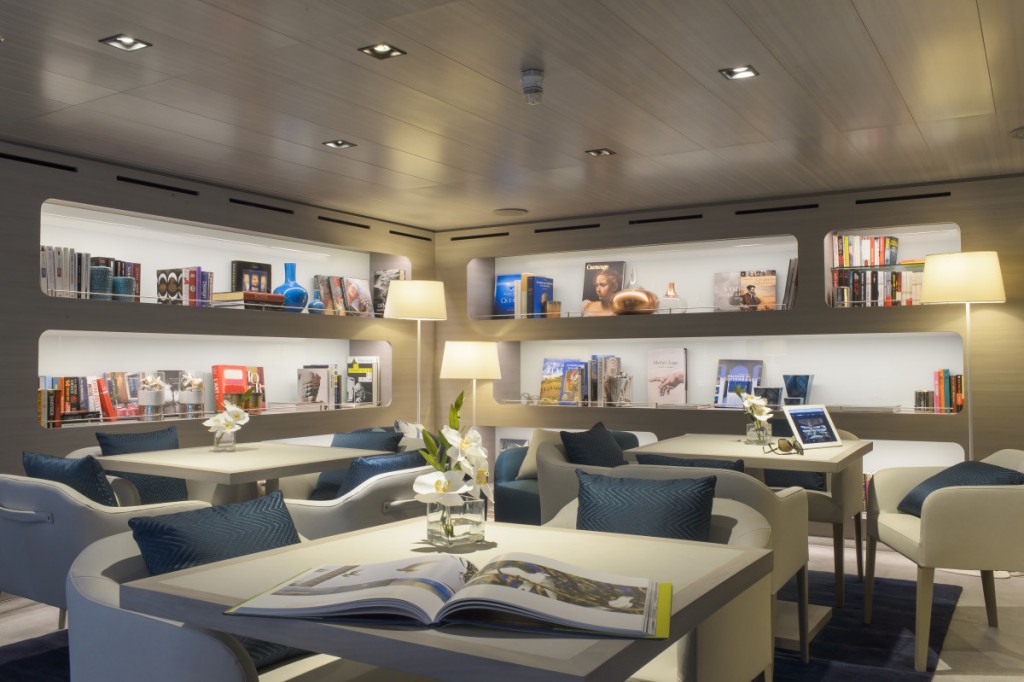
Dedicated to leisure and relaxation, the libraries onboard all our ships stock a range of books and board games. This space is also equipped with Wi-Fi connected computers.
All the ships have a special area for children onboard known as the Le Kids Club. Books, television, board games and consoles (PS4 or Wii™) are all provided for their use and enjoyment.

A photography and videography team escort you throughout your trip. These professionals capture the most beautiful moments of your cruise, which you can share with family and friends upon your return. Meet them on DECK 5 (DECK 6 on the PONANT Explorers ships) at the photo/video area, where you can also order souvenir pictures and videos.
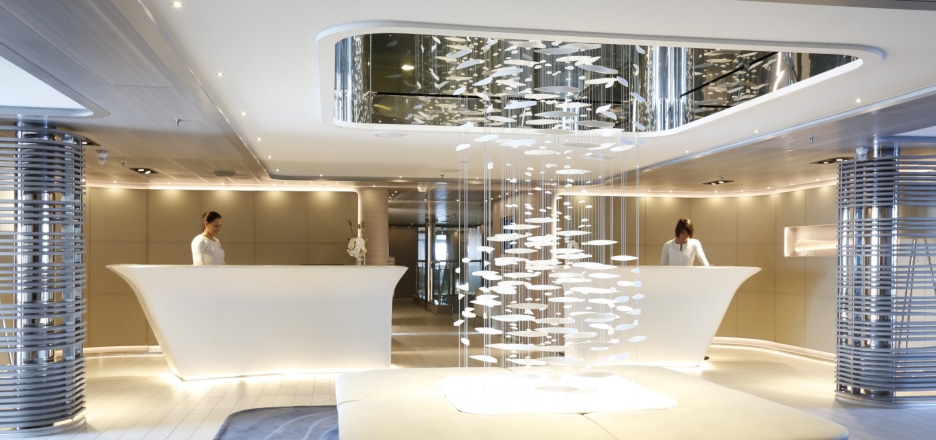
- Deck 3
- A 140 m² (1,500 ft²) space
- A reception/concierge service
- The excursions desk
- The onboard administrative services
- The sales office operated by our Customer Manager
- Our 50m² (540 ft²) shop selling a line of clothing, jewellery, beauty care products, postcards and various accessories.
- The facilities accessible to persons with reduced mobility
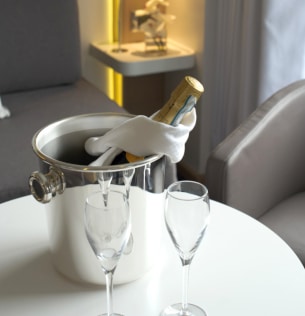
From the moment you board and throughout your cruise, your unlimited drinks are included*, at any time of the day. A drink with friends at the bar, refreshments on your return from an excursion or in the calm of your Stateroom’s balcony: enjoy a large selection of beverages (mineral waters, cold drinks, cruise wines, beer, champagne, spirits, coffee, tea). A selection of premium alcoholic drinks is also available “à la carte”.
*It doesn’t include premium alcoholic drinks indicated in the Bar Menu. It is valid only for individual personal consumption, without limitations.
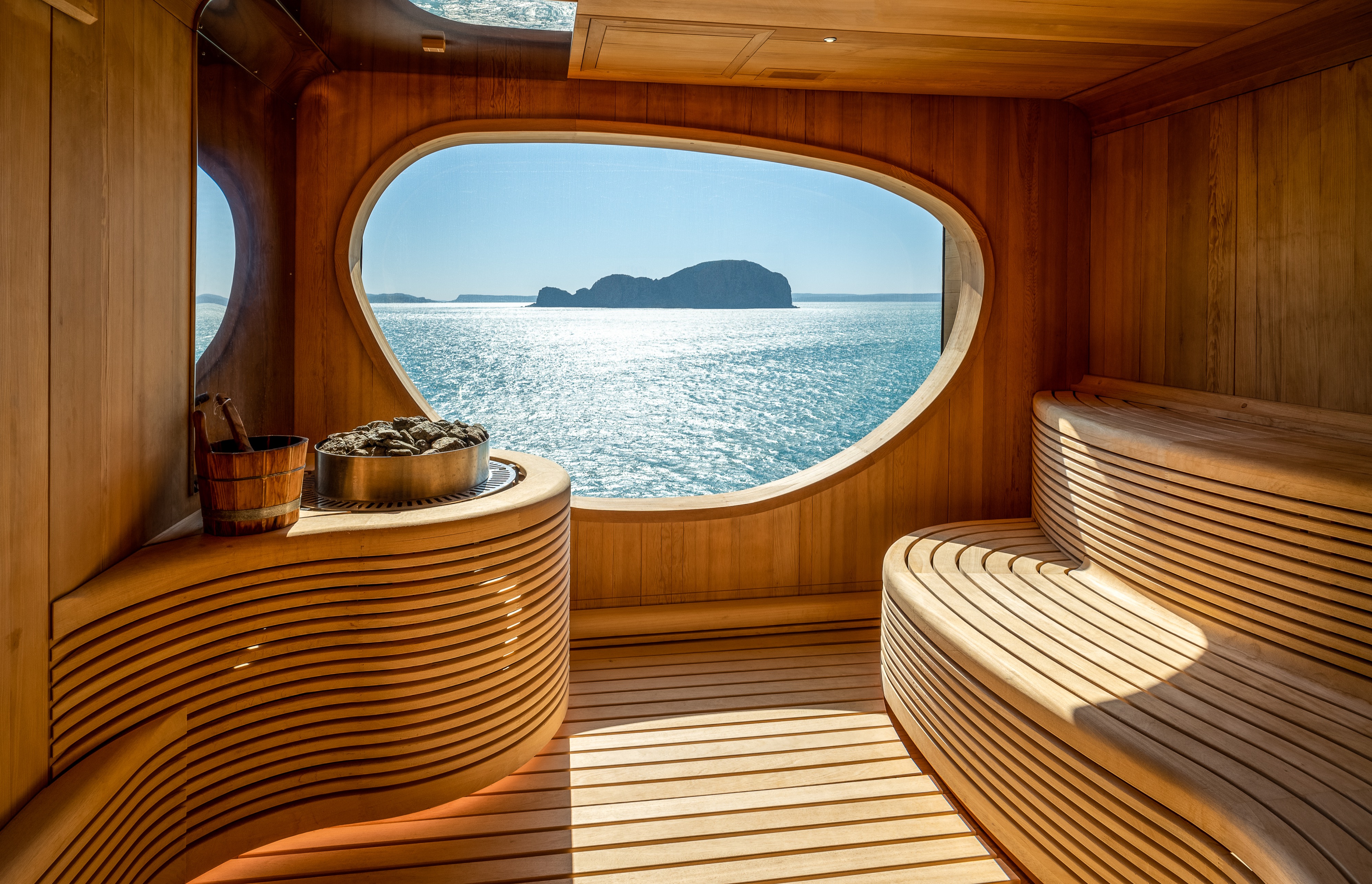
All our ships feature an onboard spa. Equipped with massage cabins and a Turkish bath (Sister ships) or a sauna (Explorers), the spa offers a wide choice of top-of-the-range treatments provided in association with SOTHYS™ or CLARINS (Le Bellot and Le Jacques-Cartier only), leading French spa and wellness centre brands.
Discover a range of facial treatments, aromatic baths, exfoliation and body massage treatments designed to provide moments of complete relaxation. You can also supplement your beauty ritual with additional services such as hair-removal, makeovers, manicures and pedicures.
Wellness area – Deck 7
Spa in partnership with CLARINS™: massage and treatment cubicles, beauty care cubicle
KÉRASTASE / L’Oréal Paris hair salon
Free access sauna (open during the day)
Gym (open during the day)
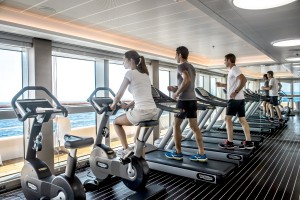
The gyms on our ships are equipped with the very latest Technogym© equipment and machines. Treadmills, exercise bikes, Kinesis Wall© strength training machines and many other types of equipment are all provided in a laid-back relaxing environment. The wide floor-to-ceiling windows looking out over the sea add undeniable charm to the exercise sessions.
Each day also begins with organised morning workout sessions, either out in the open air or in the theatre. These are supplemented by water aerobics in the pool, or in the sea off the beach for PONANT passengers, when the situation allows it.

Provided in partnership with KÉRASTASE® and L’ORÉAL PROFESSIONNEL®, the hairdressing salon offers a complete range of top quality treatments designed to strengthen, nourish and reinvigorate hair’s shine and brilliance. Our stylists are available to serve all your styling, highlighting, colouring, cutting and tailored hair advice needs.
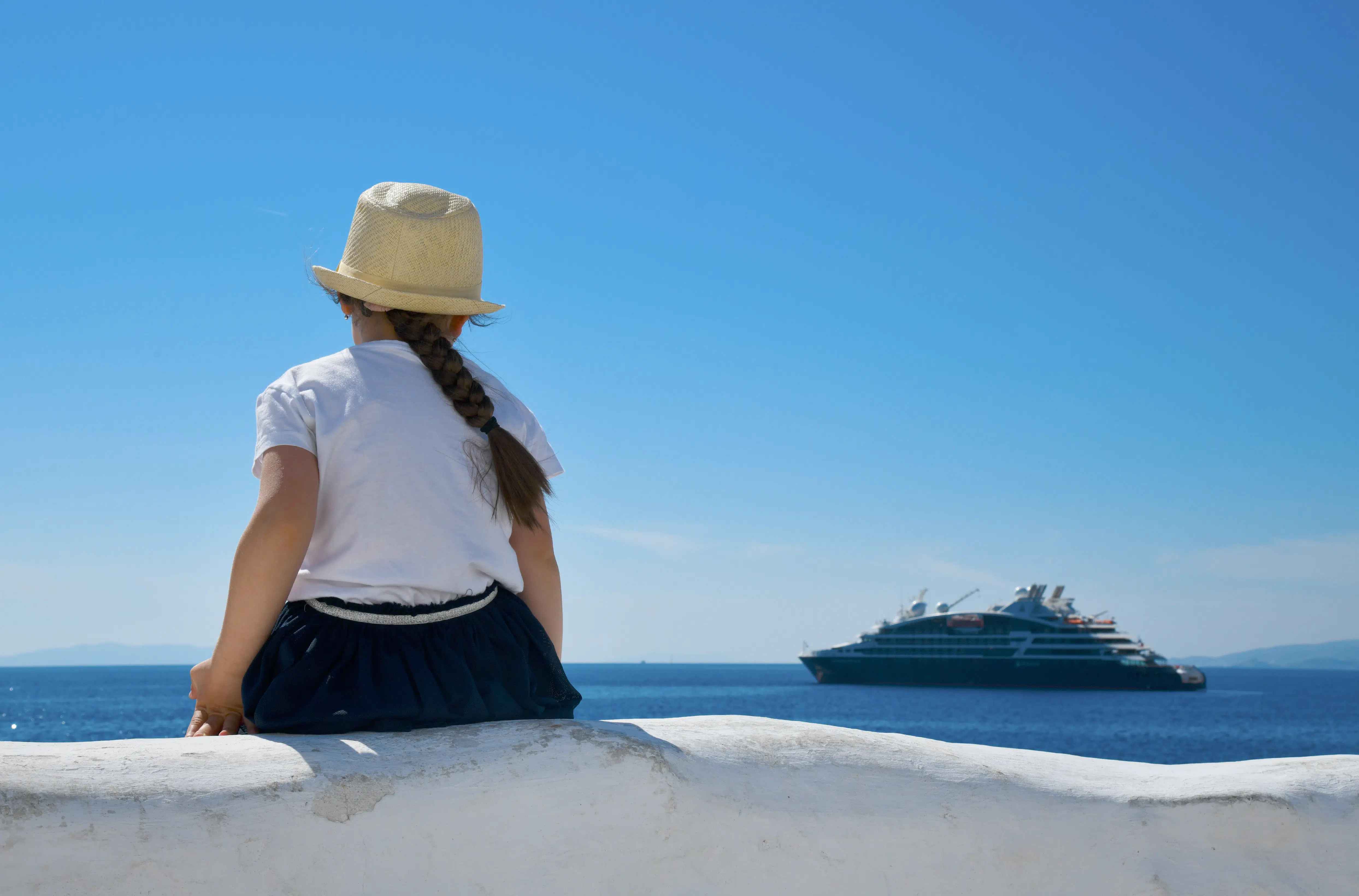
Because it’s important to reach new generations and make children aware of environmental protection issues from an early age, PONANT has joined forces with the Maud Fontenoy Foundation to help run its Ocean Explorers club for children. In total this summer, 17 cruises will offer children aged 4 to 13 a programme of activities dedicated to the ocean protection theme.
Raising awareness of oceans protection from an early age
The Maud Fontenoy Foundation is providing PONANT’s activity teams with fun educational kits, activity sheets and videos highlighting why oceans need to be protected. From creative activities (drawing, painting, a giant map of the world to colour in, etc.) to meditation initiation sessions, the programme is very varied. And from 2023, it will also include fun educational workshops on the water cycle, biodiversity, astronomy, and geology.
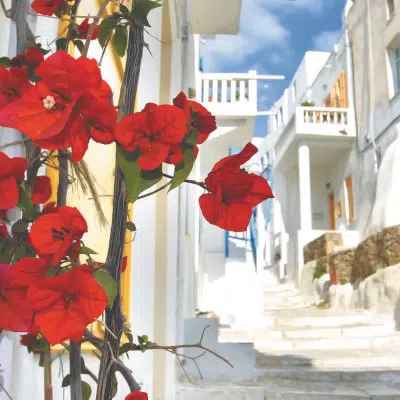
Children aged 4-13 will have the opportunity to do excursions such as watersports, beach games and swimming, treasure hunts, and even guided tours. For larger groups, a naturalist guide will join the team running the sessions and give a talk on local fauna and flora.
Your stateroom Officer will be able to take care of your laundry**. The washing and ironing of your clothes will take between 24 and 48 hours. Only ironing** can be delivered on the same day. As dry-cleaning is not possible on the ship, please only give us clothes that can be washed in water.
** These services are not free of charge and are billed directly to your stateroom account.
Closed spaces such as the lounges, the dining room, the staterooms and the reception are non-smoking areas. We invite you to smoke in designated outdoor parts of the ship.
Adapters are provided on board, they are available at the reception office of our ships.
European Standard Sockets
The 220 volt 50 hertz alternating current is distributed by sockets meeting European standards. Onboard power is 200 volt AC (European standard) and 110 volt AC (North American standard). For safety reasons, hair irons and clothes irons cannot be used in staterooms. Please note that on Le Ponant, 110 volt AC is only available in stateroom bathrooms.
Children under one year of age shall not be authorised to embark on the ships.
For children aged between 1 and 8 years old, an authorisation to board the ship must be made in writing to PONANT. Subject to agreement, a liability waiver must be completed and returned to the company to validate the registration.
On classic cruises (“yachting”), children are accepted from the age of one, with a maximum of 5 children between 1 and 6 years old on board.
On “expedition” cruises children are accepted from 6 years old (except cruises aboard Le Commandant Charcot) and must be fully independent during all the outside activities organised and during disembarkation in rubber boats, be sufficiently tall to sit on the inflatable sides of the boats, and old enough to understand, and immediately respond to the orders given by the persons in charge. As a result, children’s participation in any activity in an inflatable boat shall be subject to the agreement of the Captain and of the Expedition Head, depending on the sea conditions, and the difficulty of disembarking at each location visited. The ships do not carry Parka’s in children’s sizes. Parents must arrange to bring a suitable Parka for children. In all cases, children and young people under the age of 18 are at all times on board or on land under the full and total responsibility of their parents or carers.
Children aged 4 years or more can be welcomed in the Kid’s Club when the service is offered on board
The crew are bilingual in French and English. All signage and announcements made are in French and English. On certain cruises, crew members also speak other languages.
A satellite telephone system is at your disposal for contacting anyone, anywhere in the world. The cost of the call is added to the stateroom account (€6/minute). Calls that you receive can be transferred directly to your stateroom or to any other communal area on the ship. To receive or send faxes, please see Reception.
Free Wi-Fi internet access is available on all of our ships, in both the staterooms and the communal areas. One or several computers are at your disposal in the recreation centres. Please note that the Wi-Fi connection may be discontinued depending on the navigation area and landscapes that may block the vessel from satellite coverage, especially at high latitudes (no connection possible beyond 80° North or South), or for technical reasons beyond our control.
There is a doctor on board available to the passengers on all our ships:
- The schedules of consultation are listed each day in the log book (emergency consultation 24/7).
- The Sisterships, PONANT Explorers and Le Commandant Charcot also have a hospital for any small surgery.
- During the excursions, the passengers are accompanied by a doctor or a nurse.
- There is a fee for consultations on board . The price may vary according to the time and place of the consultation (hospital or staterooms). You must also pay for medications.
- The doctor on board is not authorised to distribute sick leaves and prescriptions. Only accounts and invoices are provided which may be used by the passenger to obtain a refund from his/her health insurance if his/her contract allows.
Medical Consultations
There is a charge for medical consultations undertaken by the doctor or nurse on board. The price can vary according to the time and place of the consultation (hospital or stateroom). Any medication must also be paid for by the passenger. If using medications on a regular basis make sure to bring adequate supplies for the duration of your cruise.
Special Medical Treatment
If you have any special treatment, we ask you to inform the reservation service when you register for the cruise, to note it on the information sheet before departure, then inform the on-board crew at the moment of departure and always keep your medication with you for the duration of the cruise.
Seasickness
Our ships (except Le Ponant) have stabilisers equipped with dynamic fins which adapt to the movements of the ship. This system allows the ship to anticipate and compensate for the pitching and tossing of the sea to achieve greater stability. Passengers suffering from seasickness will see their symptoms alleviated and are pleasantly surprised to not feel uncomfortable during their journey. However it is wise to bring travel motion medication with you for peace of mind.
Our Sisterships, PONANT EXPLORERS and Le Commandant Charcot were designed for people with reduced mobility in mind:
- Specially designed staterooms;
- Access ramps allowing easy movement in communal areas;
- Posters, signage and stateroom numbers are translated into Braille.
Despite these arrangements, each passenger should be able to be independent or travel with a close family member or friend who can give them whatever assistance they require during their trip.
If a person has not been judged suitably fit for travel in complete safety, the company reserves the right to refuse their embarkation. Disembarkation in difficult places or in a Zodiac® is subject to the approval of the Captain, who will always have the safety and wellbeing of the passenger in mind.
Technical Accessories
We advise you to equip yourself with a ski mask, sunglasses, walking poles (available to purchase in the shop), a waterproof rucksack, binoculars, a technical watch, a mosquito head net (for the Arctic) and a waterproof pouch.
We advise our passengers to wear casual and elegant outfits at their convenience, and more formal attire for the Captain’s Dinner.
Sustainable development is enshrined in the company’s articles of association and has been at the heart of the PONANT project since its inception. Founded over thirty years ago by committed sailors, the company was born out of a desire to share a passion for the oceans and the treasures of the Earth. This responsibility commits us to a respectful dialogue with the environment and the populations we meet and to investing in many fields related to the preservation and development of the natural and cultural heritage of the polar and oceanic regions.
Clean Ships
We were among the first cruise operators in the world to abandon the use of heavy fuels, and our ships are equipped with electric diesel engines and SCR catalytic converters, which enable a reduction in fuel consumption and emissions. Our polar exploration ship, Le Commandant Charcot, is a hybrid-electric vessel, propelled by liquefied natural gas (LNG). LNG enables a 25% reduction in carbon emissions, an 85% reduction in nitrogen oxide emissions and a 95% reduction in fine particle emissions. Each time we design a new ship, we equip it with the latest available eco-technologies, enabling us to maintain our position as the cruise industry’s environmental leader, ahead of international regulations in some areas. A commitment recognised by many independent organisations:
- Our entire fleet is Clean Ship certified by the Bureau Veritas. This certification guarantees that our ships fulfil very precise criteria: emissions levels, waste processing, waste water etc.
- In 2020, PONANT was recognised as “the cruise operator with the greenest fleet in the world in terms of airborne emissions” by the German NGO, NABU.
- PONANT was awarded the Prix des Palmes du Tourisme Durable 2020 (Prize for Sustainable Tourism) in the “Voyage” category for the elimination of heavy fuel oil in favour of LS MGO.
- In 2019, PONANT became the first European cruise company to obtain the North American Green Alliance certificate. This certifies that its members have adopted practices and technologies that are respectful towards the environment.
- PONANT is also a signatory of the Charte Bleue from Armateurs de France, which commits the maritime sector to act to protect the marine environment.
Wastewater
All of the wastewater is treated by means of processes that exclude the use of chemical products. The recycled water is used to clean the exterior of the ship. The water that is discharged into the sea is treated, drinkable water.
Waste
We have optimised our organisation in order to reduce waste at the source. Waste is nonetheless still produced on board. As of 2020, 60% of this is sorted and recycled, with an objective of 85% set for 2023. We ensure the complete traceability of this waste.
Single-use plastics
We have eliminated the use of single-use plastics (straws, cups, food serving trays, laundry bags etc.). A metallic flask is issued to each passenger on expedition cruises and water fountains are available in the common areas of the ships. We are also developing the bottling of our water in glass bottles.
And so that everyone’s tastes are catered to, special menus are available on request for guests with specific dietary requirements (low-fat, vegetarian, gluten-free, etc).

- Spa
- Fitness
- Hair Salon
- Sun Deck

- Art Gallery/Photo Video
- Panoramic Lounge
-
Ocean Young Explorers
- Privilege Suites
- Grand Deluxe Suites
- Deluxe Suites
- Prestige Suites
- Prestige Staterooms

- Bridge
-
Owners Suites
- Prestige Suites
- Deluxe Suites
- Privilege Suites
- Prestige Staterooms
- Accessible Staterooms

-
Restaurant
- Prestige Staterooms
- Deluxe Suites
- Accessible Staterooms

- Pool
- Grill
- Main Lounge
- Shop
- Excursion Desk
- Reception Desk
- Theatre
- Medical Centre
-
Deluxe Suites
- Deluxe Staterooms

